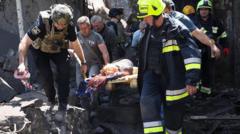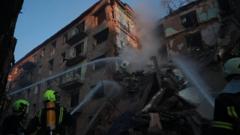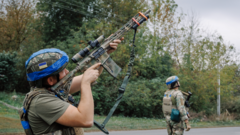In his address to the German parliament, Chancellor Friedrich Merz emphasized the urgent need for a united and strong defense posture in Europe as NATO leaders arrived in The Hague for a significant summit. With security concerns escalating due to Russia's aggressive stance, Merz asserted that Germany would uphold its “fair share” to ensure peace and stability across the continent. This summit marks President Donald Trump's return to NATO meetings since 2019 and highlights the call for member nations to elevate their defense expenditures significantly.
Germany Commits to Enhanced European Defense Spending Ahead of NATO Summit

Germany Commits to Enhanced European Defense Spending Ahead of NATO Summit
In a decisive step amid rising tensions, Germany signals its dedication to NATO by pledging to increase defense spending.
Ahead of the summit, NATO Secretary General Mark Rutte conveyed a strong message to European allies, urging them to invest in defense and refrain from doubting U.S. support for the alliance. He reiterated America’s commitment, encouraging European nations, alongside Canada, which have allocated over $35 billion in military aid to Ukraine this year, to align their spending. Amidst ongoing conflicts in Ukraine, where new missile strikes have recently resulted in casualties, the urgency for NATO nations to unite and fortify their defenses has never been clearer.
Germany's military budget will see a major increase, with pledges for €62.4 billion in 2025, escalating to €152.8 billion by 2029. The German government’s commitment to meet NATO’s target of 3.5% of GDP for defense spending by 2035 responds not only to external threats but also reflects Germany's resolve to contribute meaningfully to transatlantic security. This summit could reshape NATO’s spending targets, transitioning from past norms to a revised benchmark of 5% of GDP for defense overall, a goal some member nations are currently struggling to meet.
Concerns remain among NATO members, including Spain, where Prime Minister Pedro Sánchez has expressed hesitance about the new spending thresholds. Nevertheless, despite differing opinions on these targets, consensus is expected as all 32 allied nations appear poised to align under the new spending framework despite internal debates.
As the NATO summit unfolds in The Hague, discussions among leaders will focus on strengthening collective defense strategies and re-evaluating the commitments each country is prepared to undertake in the face of evolving global security challenges. Meanwhile, security measures in the Netherlands are heightened with disruptions noted in transport networks, hinting at broader geopolitical tensions surrounding the event.
With collaborative efforts to bolster military expenditure, NATO aims to position itself better against threats while ensuring that all member nations play their part in safeguarding stability within Europe.
Germany's military budget will see a major increase, with pledges for €62.4 billion in 2025, escalating to €152.8 billion by 2029. The German government’s commitment to meet NATO’s target of 3.5% of GDP for defense spending by 2035 responds not only to external threats but also reflects Germany's resolve to contribute meaningfully to transatlantic security. This summit could reshape NATO’s spending targets, transitioning from past norms to a revised benchmark of 5% of GDP for defense overall, a goal some member nations are currently struggling to meet.
Concerns remain among NATO members, including Spain, where Prime Minister Pedro Sánchez has expressed hesitance about the new spending thresholds. Nevertheless, despite differing opinions on these targets, consensus is expected as all 32 allied nations appear poised to align under the new spending framework despite internal debates.
As the NATO summit unfolds in The Hague, discussions among leaders will focus on strengthening collective defense strategies and re-evaluating the commitments each country is prepared to undertake in the face of evolving global security challenges. Meanwhile, security measures in the Netherlands are heightened with disruptions noted in transport networks, hinting at broader geopolitical tensions surrounding the event.
With collaborative efforts to bolster military expenditure, NATO aims to position itself better against threats while ensuring that all member nations play their part in safeguarding stability within Europe.





















